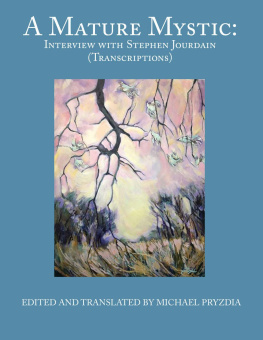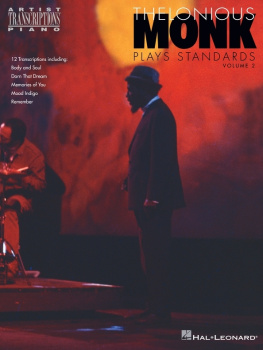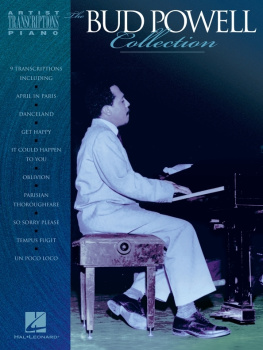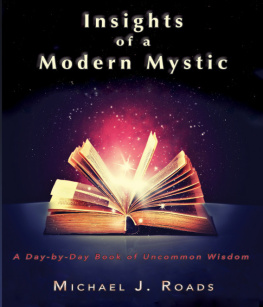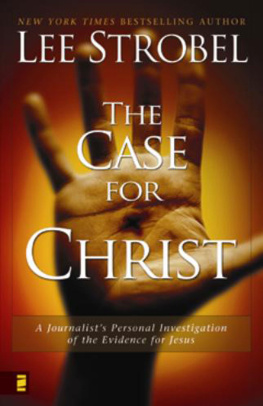Michael Pryzdia - A Mature Mystic: Interview with Stephen Jourdain (Transcriptions)
Here you can read online Michael Pryzdia - A Mature Mystic: Interview with Stephen Jourdain (Transcriptions) full text of the book (entire story) in english for free. Download pdf and epub, get meaning, cover and reviews about this ebook. year: 2020, publisher: IQ2 Publishing, genre: Religion. Description of the work, (preface) as well as reviews are available. Best literature library LitArk.com created for fans of good reading and offers a wide selection of genres:
Romance novel
Science fiction
Adventure
Detective
Science
History
Home and family
Prose
Art
Politics
Computer
Non-fiction
Religion
Business
Children
Humor
Choose a favorite category and find really read worthwhile books. Enjoy immersion in the world of imagination, feel the emotions of the characters or learn something new for yourself, make an fascinating discovery.
- Book:A Mature Mystic: Interview with Stephen Jourdain (Transcriptions)
- Author:
- Publisher:IQ2 Publishing
- Genre:
- Year:2020
- Rating:5 / 5
- Favourites:Add to favourites
- Your mark:
- 100
- 1
- 2
- 3
- 4
- 5
A Mature Mystic: Interview with Stephen Jourdain (Transcriptions): summary, description and annotation
We offer to read an annotation, description, summary or preface (depends on what the author of the book "A Mature Mystic: Interview with Stephen Jourdain (Transcriptions)" wrote himself). If you haven't found the necessary information about the book — write in the comments, we will try to find it.
Michael Pryzdia: author's other books
Who wrote A Mature Mystic: Interview with Stephen Jourdain (Transcriptions)? Find out the surname, the name of the author of the book and a list of all author's works by series.
A Mature Mystic: Interview with Stephen Jourdain (Transcriptions) — read online for free the complete book (whole text) full work
Below is the text of the book, divided by pages. System saving the place of the last page read, allows you to conveniently read the book "A Mature Mystic: Interview with Stephen Jourdain (Transcriptions)" online for free, without having to search again every time where you left off. Put a bookmark, and you can go to the page where you finished reading at any time.
Font size:
Interval:
Bookmark:
A Mature Mystic :
Interview with
Stephen Jourdain
(Transcriptions)
Edited and Translated by
Michael Pryzdia
Illustrations: Jim Pryzdia
Published in the United States of America.
This edition first published in
Phoenix, Arizona by IQ2 Publishing.
All rights reserved. No portion of this book may be reproduced, stored in a retrieval system, or transmitted in any form or by any means electronic, mechanical, photocopying, recording, scanning, or other except for brief quotations in critical reviews or articles, without the prior written permission of the publisher.
Copyright 2020 by Michael Pryzdia
IQ2Publishing.com
A Mature Mystic:
Interview with Stephen Jourdain
ISBN: 978-0-578-70660-3
Table of Contents
One must, at least after a certain
stage, see that the awakening lies
at the very heart of the idea one
has about oneself... Me is to be
found at the core of the
concept of me.
---Stephen Jourdain
Stephen Jourdain was a mystic who died in 2009. A brief synopsis of his life is shared in the book Radical Awakening: Cutting Through the Conditioned Mind (2001). While Jourdain was a very accomplished writer who wrote many books in his native French, Radical Awakening is, to my knowledge, the only book that has been published in English to date. The book is actually an interview with Jourdain that was done by the French journalist Gilles Farcet. If one were to read Radical Awakening , one would gain some insight into the nature of the character of Stephen Jourdain (and one would see that he truly was a character) and one would also be exposed to what I call here a mature mysticism or a mature spirituality.
The following is a transcript of a YouTube interview available on the internet that was originally divided into ten parts; I decided to treat each part as a separate section of the text offered here. While Jourdain is well-known in France, he is not well-known in America or in the West in general. The bulk of what is available in the English language is this YouTube interview (fully transcribed here for the first time) and his interview with Farcet. While Jourdains English was a bit broken in the interview shared here*, and although he was a bit animated at times, I decided to adhere to the actual interview as spoken/delivered to the best of my ability. The content covered in this interview is in alignment with what is found in Radical Awakening** , though here it is not presented in an editorialized, organized manner as is done in Radical Awakening . I must admit that I did consider filling in the blanks with a series of footnotes that I could have sprinkled throughout the text; but I decided to keep any notes/commentary to a bare minimum. I wanted to let Mr. Jourdain speak to the reader as directly and naturally as possible without numerous interruptions in the pacing of his delivery.
Rest assured: anyone familiar with spiritual literature will see all kinds of parallels to the teachings generally found in Zen Buddhism and Advaita Vedanta Hinduism. Certainly, the concepts Jourdain shares here will immediately evoke in the reader comparisons to be found in the work of Sri Ramana Maharshi (1879-1950) and Shri Nisargadatta Maharaj (1897- 1981).
But I want to stress here that Stephan Jourdain was unique! Indeed, this uniqueness was one of the things that Jourdain took pride in. His is a message that resonates with Eastern spiritual teachings -- but is delivered by a Western individual who greatly values individualism. Individualism is generally not valued in Eastern spiritual teachings where disciples have always traditionally given their entire psyches over to the guru -- the master who then instructs his or her followers as to what to eat, dress, think, and do. Jourdains message resonates with readers because while he was a very typical human being -- he simply attempted to live his life -- loving his wife and family, and getting his job done (selling Real Estate) -- he learned at the young age of 16 -- after having his initial awakening (which he describes as being like an explosion of the cosmos) that he was VERY, VERY different. Thus, Jourdain lived a typical life -- but did so differently. He did attempt to share his awakening with family members while he was young; but he quickly determined that they began to conclude that he must be psychologically unbalanced -- so he simply stopped sharing. But he could never completely shake the experience of thinking to himself that it was almost a duty to share -- it was as if he had gold in his pockets -- he was a very rich man -- and he was compelled by compassion to share his wealth. He must have felt like Platos Philosopher-King who is compelled to return to the cave (after discovering Truth, Beauty, and Goodness) in order to aid the slaves -- those trapped in appearances -- those who seem quite unable to listen and SEE -- those who live a life of suffering.
Jourdain never saw himself as a teacher though; he simply wanted to accurately describe what happened to him at a very young age -- and how he grew into his awakening. He saw himself more like a reporter -- BUT a reporter who was also an artist. Jourdain took great pride in how he communicated with others -- he took great pains at being the best writer he could be; thus, he wrote literary pieces to the best of his ability. It was not enough to simply give a talk or an interview and then have what he said transcribed into a book -- so that the sacred words of a master could be read -- so that a life could be emulated. No! Jourdain was both a mystic -- and a writer. And again, he did his best to write as an individual who stressed the importance of NOT assaulting duality. Seeing himself as a grain of salt that needed to dissolve into the cosmic ocean was NOT a goal of Stephen Jourdains. The man was a husband and a father -- who had to pay the bills. He was a man who loved the particular, the most mundane events -- quite unspiritual activities such as eating a good sandwich, drinking a fine glass of wine or playing a good game of golf -- or smoking a good cigarette!!
And then there was his sense of humor. Jourdain could laugh at himself as he struggled in his profession. He states in Radical Awakening that his day-to-day life was quite laughable -- but always entertaining. This was not a stern spiritual man! Indeed, like all truly awakened individuals (the term individual quite literally means undivided), Jourdain most likely discerned at a young age, that if you meet a spiritual man or woman who cannot laugh at the experience of being alive -- then you simply run away -- no wisdom there!
I never met Stephen Jourdain, but he strikes me as a man who relished being alive -- every moment was an eternal moment for the man -- a divine moment in the best sense of the word. It appears that for Stephen Jourdan, each moment was whole ; he appears to have surmised fairly early on that it is thought that fragments what we call reality (i.e. thought is fragmentary ); he saw how most people live as fragments, having very little contact with wholeness; he must have also seen (judging by what is shared in the interview that follows) that that thought is also participatory : that is, he saw how thought creates a reality -- which then a thinker supposedly experiences. To live this way was to live in a dream for Jourdain. But one needs to AWAKEN from the dream, like the Buddha (Buddha is derived from the word Bodhi -- to awaken). Stephen Jourdains life seems to have been one filled with joy -- and awe -- the man was FULLY alive. And like most men and women of this order, Stephen Jourdain completely shunned the term spiritual -- again, this kind of shunning is the mark of a truly wise human being -- this is a mature mystic.
There are a multitude of different types of mystics. But generally, a mature mystic is simply a human being who, with the operation of insight and intelligence, allows him or herself to truly SEE -- to truly understand some kind of initial spiritual radical awakening or illumination so that wisdom can flower. Wisdom is simply the understanding of the limits of thought -- and it is a direct outcome of insight (a seeing into the nature of thought/knowledge). Some mystics have their entire nervous system re-wired as a result of some kind of spiritual experience. They can see, smell, feel things that normal individuals do not. Many get inflated with the onset of what are generally called in the Eastern spiritual traditions the yogic siddhis (powers) -- and many thereby end up living a life filled with more sorrow, not less. They are not free or enlightened, despite what they may say.*** And there are MANY of these folks floating amongst us today; many become self-proclaimed gurus, pundits, masters etc.; you have your choice of them via YouTube and the internet. These are people who lack wisdom -- that is, not understanding how thought functions, they are trapped in thought; they are at the mercy of thought -- even if they promise you that they can stop thought, both theirs and yours -- these people do not know the limits of thought. If you closely examine what Stephen Jourdain shares with us, you will discover a mystic with wisdom.
Font size:
Interval:
Bookmark:
Similar books «A Mature Mystic: Interview with Stephen Jourdain (Transcriptions)»
Look at similar books to A Mature Mystic: Interview with Stephen Jourdain (Transcriptions). We have selected literature similar in name and meaning in the hope of providing readers with more options to find new, interesting, not yet read works.
Discussion, reviews of the book A Mature Mystic: Interview with Stephen Jourdain (Transcriptions) and just readers' own opinions. Leave your comments, write what you think about the work, its meaning or the main characters. Specify what exactly you liked and what you didn't like, and why you think so.

